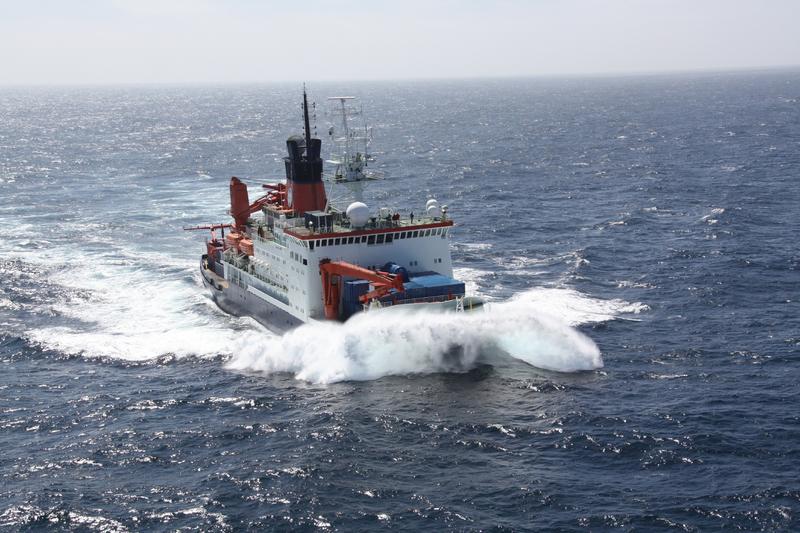

RV Polarstern in the Atlantic Ocean
Photo: F. Mehrtens / Alfred-Wegener-Institut
On 29 October 2015 the research icebreaker Polarstern will leave its homeport in Bremerhaven for Cape Town, South Africa, where it is expected to arrive on 1 December. It will take 32 students hailing from 19 countries on board, who will be introduced to the latest methods and instruments used in oceanography. Nine instructors from the Alfred Wegener Institute, Helmholtz Centre for Polar and Marine Research (AWI), the FU Berlin and Ireland’s Galway-Mayo Institute of Technology will teach the participants in the “floating summer school”.
470 applications from around the globe were submitted for the 32 places on the North South Atlantic Transect Training Programme (NoSoAT). Following an earlier training expedition to investigate cold water coral communities in the Atlantic aboard the Irish National Research Vessel Celtic Explorer in 2014, this marks the second Floating Summer School offered by the AWI, together with POGO (Partnership for Observation of the Global Oceans), Japan’s Nippon Foundation, and Ireland’s SMART (Strategic Marine Alliance for Research and Training). The programme also receives financial support from the Stiftung Mercator foundation.
“We have students from all marine disciplines on board, from geology to atmospheric research,” says Prof Karen Wiltshire, Chair of POGO and Vice Director of the Alfred Wegener Institute, who will also be one of the expedition instructors. She will be heading one of five projects, which all of the young researchers will complete, working in small groups.
The unifying theme is the analysis of plankton communities (tiny algae and animals that live in the water column). During the voyage, which will take them from the North Atlantic, across the Tropics and into the South Atlantic, the expedition participants plan to investigate how plankton diversity is being affected by changing environmental conditions.
To do so, the students will measure the basic physical, chemical and biological parameters of the ocean. They will analyse e.g. the temperature and salinity of the seawater and use plankton nets to identify the organisms collected under the microscope. They’ll also explore how satellite imaging can offer insights into species diversity in the ocean, as well as carrying out experiments of their own.
“I’m looking forward to setting up a working hypothesis with the students, defining the study design, conducting experiments, and testing the hypothesis in the analysis,” states Prof Karin Lochte, whose project will familiarise the participants with scientific working methods.
“We also want to stimulate interdisciplinary discussions among the young researchers. Besides the daily presentations, RV Polarstern offers the perfect setting. We’ll be spending several weeks together on board, which will give us plenty of opportunities to develop exciting ideas for new projects and collaborations,” explains the AWI’s Director, based on her past experience of how expeditions can create many lasting connections.
In addition to the training, atmospheric research will also be a focus during the voyage from Bremerhaven to Cape Town. “We’ll also be testing and calibrating sounders, which our colleagues on the subsequent expeditions to the Antarctic will use to detect schools of fish in the water column,” reports Dr Rainer Knust, the Scientific Coordinator of the Polarstern at the Alfred Wegener Institute.
After Cape Town, RV Polarstern will set course for the Antarctic. After resupplying the Neumayer Station III shortly before Christmas, it will turn its attention to oceanographic and biological research near the Filchner-Rønne Ice Shelf. The next leg of the journey will involve taking long-term measurements in the Weddell Sea on the way to the ship’s next port of call in Punta Arenas (Chile).
From Chile, it will embark on an expedition with various geoscientific and biological focus points in the Drake Passage between South America and Western Antarctic Peninsula in February 2016. After returning to Punta Arenas, atmospheric researchers will take advantage of the five-week return voyage to Bremerhaven, where Polarstern is expected in mid-May.
Notes for Editors: Printable images can be found at http://www.awi.de/nc/en/about-us/service/press.html.
Your contact partner at the Department of Communications and Media Relations is Dr Folke Mehrtens (phone: +49 471 4831-2007; e-mail: Folke.Mehrtens(at)awi.de).
The Alfred Wegener Institute, Helmholtz Centre for Polar and Marine Research (AWI) conducts research in the Arctic, Antarctic and oceans of the high and mid-latitudes. It coordinates polar research in Germany and provides major infrastructure to the international scientific community, such as the research icebreaker Polarstern and stations in the Arctic and Antarctica. The Alfred Wegener Institute is one of the 18 research centres of the Helmholtz Association, the largest scientific organisation in Germany.
http://www.awi.de/nc/en/about-us/service/press/press-release/polarstern-embarks-…












